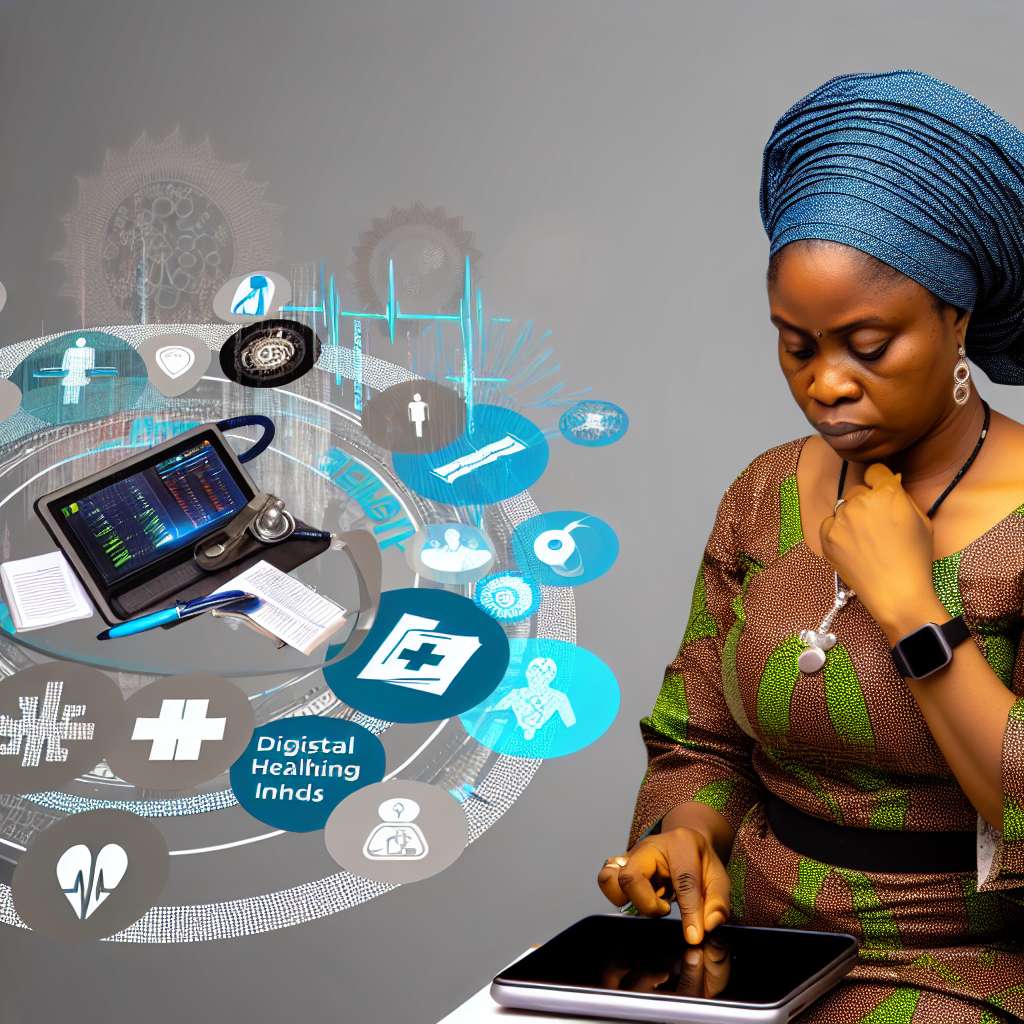Introduction:
Nigeria faces challenges in public health due to limited resources and infrastructure.
Digital health innovations play a crucial role in enhancing healthcare delivery in the country.
Overview of Digital Health Innovations in Nigeria
Digital health innovations refer to the use of technology to improve healthcare delivery, access to healthcare services, and health outcomes.
Examples of digital health innovations in Nigeria:
- Telemedicine platforms connecting patients with healthcare providers remotely.
- Mobile health applications for tracking health metrics and accessing medical information.
- Electronic health records systems for storing and managing patient data.
Impact of these innovations on public health outcomes:
- Improved access to healthcare services, especially in rural and underserved areas.
- Enhanced efficiency in healthcare delivery, reducing wait times and increasing patient satisfaction.
- Better monitoring of health metrics, leading to preventive care and early intervention.
- Facilitation of data collection and analysis for public health research and policy-making.
- Increased patient empowerment through access to information and self-management tools.
Challenges and Opportunities
Identification of key challenges facing the implementation of digital health innovations in Nigeria
- Limited Infrastructure: Lack of adequate technology infrastructure hinders widespread adoption.
- Low Digital Literacy: Many Nigerians may struggle to navigate digital health platforms effectively.
- Cost Constraints: Affordability of digital health services remains a challenge for the general population.
- Data Privacy Concerns: Ensuring the protection of personal health information is critical.
- Regulatory Hurdles: Navigating complex regulatory frameworks can slow down innovation efforts.
Opportunities for growth and advancement in the field
- Increased Access: Digital health platforms can reach underserved populations in remote areas.
- Enhanced Efficiency: Streamlining processes can improve the overall healthcare delivery system.
- Personalized Care: Tailoring health interventions based on data analytics can lead to better outcomes.
- Innovation Ecosystem: Collaborations between stakeholders can drive innovation in the sector.
- Job Creation: The expansion of digital health could create employment opportunities in tech-related fields.
Strategies for overcoming challenges and maximizing opportunities
- Investment in Infrastructure: Building a robust technology backbone is crucial for scalability.
- Educational Campaigns: Promoting digital literacy through awareness campaigns can empower users.
- Public-Private Partnerships: Collaboration between government and industry players can drive progress.
- Data Protection Measures: Implementing strict protocols for data privacy is essential for trust.
- Streamlined Regulations: Working towards clear and concise regulations can foster innovation.
By addressing these challenges and harnessing the opportunities present, Nigeria can truly leverage digital health innovations to improve public health outcomes and enhance healthcare delivery across the country.
Discover More: Radiography Ethics and Best Practices in Nigeria
Telemedicine and Telehealth
Telemedicine involves using technology to provide healthcare services remotely.
Telehealth encompasses a broader range of telecommunication technologies to support healthcare delivery and services.
How Telemedicine is being Utilized in Nigeria’s Public Health System
In Nigeria, telemedicine is being used to connect patients with healthcare providers.
This is especially important in remote areas where access to healthcare services is limited.
Virtual consultations are one way telemedicine is being utilized in Nigeria.
Remote monitoring of patients’ vital signs also plays a key role.
Additionally, tele-education for healthcare practitioners is being implemented.
Benefits and Limitations of Telemedicine in Improving Healthcare Access
Benefits:
- Increased access to healthcare services, especially in underserved areas.
- Cost-effective delivery of healthcare services.
- Reduction in unnecessary hospital visits through remote consultations.
- Improved management of chronic conditions through remote patient monitoring.
Limitations:
- Technological barriers in remote and rural areas with limited connectivity.
- Lack of physical examination and hands-on assessment by healthcare providers.
- Privacy and security concerns related to the transmission of sensitive health information.
- Challenges in integrating telemedicine into existing healthcare systems.
Telemedicine and telehealth have the potential to revolutionize Nigeria’s public health system.
These innovations can expand access to healthcare services and improve the efficiency of healthcare delivery.
It is essential to address the limitations and challenges to maximize the benefits of these digital health innovations.
Find Out More: Oral Biology in Nigerian Dentistry Curriculum
Electronic Health Records (EHRs):
– EHRs play a crucial role in improving healthcare delivery by providing a centralized digital platform for storing patient information.
– The adoption of EHRs in Nigeria’s public health sector is gradually gaining momentum, with various initiatives aimed at digitizing health records.
– One of the key benefits of EHRs is that they enhance patient care by allowing healthcare providers to access accurate and up-to-date information.
– EHRs also streamline administrative processes, such as scheduling appointments and managing billing, leading to more efficient patient management.
– By enabling easy sharing of patient data among healthcare providers, EHRs facilitate continuity of care and improve care coordination.
– EHRs help reduce medical errors by providing decision support tools, alerts, and reminders for healthcare professionals, ensuring better patient outcomes.
– With secure access controls and encryption, EHRs ensure the privacy and security of patient information, complying with data protection regulations.
– EHRs support data analytics and reporting, allowing public health officials to track disease trends, monitor population health, and make informed policy decisions.
– Overall, the adoption of EHRs in Nigeria’s public health sector is crucial for modernizing healthcare delivery, improving patient outcomes, and advancing public health initiatives.
You Might Also Like: Radiography Equipment: What Nigerian Students Should Know
Mobile Health (mHealth) Applications:
Mobile Health (mHealth) applications have revolutionized the way healthcare services are delivered in Nigeria.
These apps leverage mobile technology to provide access to healthcare services, information, and resources to individuals across the country.
Overview of mHealth applications in Nigeria:
- Nigeria has seen a significant growth in the adoption of mHealth applications in recent years.
- These applications cater to various healthcare needs, including health education, disease management, and telemedicine services.
- They are designed to be user-friendly and accessible on smartphones, making healthcare more convenient and accessible.
Popular mHealth apps being used for public health initiatives:
- One popular mHealth app in Nigeria is the “Seamless Mobile Health System,” which provides a platform for patients to connect with healthcare providers.
- Another popular app is the “MamaYe App,” which focuses on maternal and child health, providing valuable information and support to pregnant women and new mothers.
- The “Lifebank App” is also widely used for blood donations and emergency medical services, helping to save lives in critical situations.
Impact of mHealth on healthcare access and health outcomes:
- Mobile Health applications have improved healthcare access for remote and underserved communities in Nigeria.
- Patients can now access healthcare services and information from the comfort of their homes, reducing the need for physical visits to healthcare facilities.
- These apps have also enhanced health outcomes by promoting preventive care, early diagnosis, and timely treatment of diseases.
- By facilitating communication between patients and healthcare providers, mHealth apps have increased patient engagement and compliance with treatment plans.
- mHealth applications have the potential to transform the healthcare landscape in Nigeria by improving access to quality healthcare services and empowering individuals to take control of their health.
See Related Content: Career Opportunities in Medical Laboratory Science

Data Analytics and Health Informatics
Public health decision-making in Nigeria benefits greatly from data analytics.
This involves the systematic computational analysis of data or statistics.
Health informatics plays a critical role in Nigeria by facilitating data collection, management, and analysis in the healthcare sector.
- Importance of data analytics in public health decision-making
- Use of health informatics in Nigeria for data collection and analysis
- How data analytics can improve healthcare delivery in Nigeria
Importance of Data Analytics in Public Health Decision-Making
Data analytics in public health decision-making helps policymakers and healthcare professionals make informed decisions.
These decisions are based on evidence rather than assumptions.
By analyzing large datasets, trends, patterns, and correlations can be identified.
Transform Your Career with Expert Guidance
Get personalized mentorship consulting that’s tailored to your unique path. Our expert advice is actionable and exclusive.
Get StartedThis helps guide interventions and resource allocation effectively.
Through data analytics, public health initiatives can be targeted towards specific populations or regions.
This approach ensures maximum impact and improved health outcomes.
Use of Health Informatics in Nigeria for Data Collection and Analysis
In Nigeria, health informatics involves the use of technology and information systems.
This technology serves to collect, store, manage, and analyze health-related data.
Electronic health records (EHRs) and health information systems are critical.
They aid in collecting and sharing patient data across healthcare facilities in Nigeria.
Health informatics also enables real-time monitoring of disease outbreaks.
This includes tracking resource utilization and healthcare service delivery.
Such actions facilitate better decision-making.
How Data Analytics Can Improve Healthcare Delivery in Nigeria
Data analytics can enhance healthcare delivery in Nigeria.
It identifies patterns in patient care, treatment outcomes, and disease prevalence.
Healthcare providers can optimize treatment protocols through data analysis.
This effort reduces medical errors and improves patient outcomes.
Data-driven insights inform preventive health measures.
They also guide resource allocation and policy decisions.
These measures effectively address public health challenges in Nigeria.
Policy and Regulatory Framework
- Overview of existing policies and regulations governing digital health innovations in Nigeria
- Potential changes needed to support and promote further adoption of digital health innovations
- Role of government in shaping the digital health landscape in Nigeria
Nigeria has made progress in establishing policies and regulations to govern digital health innovations.
The National Health Act of 2014 provides a legal framework for the implementation of digital health solutions in the country.
Additionally, the National Health Insurance Scheme (NHIS) Act of 1999 supports the integration of technology in healthcare delivery.
Despite these existing policies, there is still a need for further changes to support and promote the adoption of digital health innovations in Nigeria.
The government should consider strengthening data protection laws to safeguard patient information in digital platforms.
Additionally, there should be increased collaboration between the public and private sectors to enhance the implementation of digital health solutions.
The government plays a crucial role in shaping the digital health landscape in Nigeria.
It is responsible for setting policies and regulations that guide the implementation of digital health innovations.
The government should prioritize investment in digital infrastructure, such as broadband internet connectivity, to ensure universal access to digital health solutions.
Furthermore, it should establish partnerships with international organizations and donors to leverage resources and expertise in advancing digital health initiatives.
Future Trends and Implications
The digital health sector in Nigeria is poised for significant growth in the coming years.
With advancements in technology and increased access to the internet, there are several future trends and implications that can be predicted for digital health innovations in the country.
Predictions for the Future of Digital Health Innovations in Nigeria
- Increased adoption of telemedicine platforms for remote consultations.
- Expansion of wearable technology for monitoring health metrics.
- Integration of artificial intelligence for diagnosis and treatment recommendations.
- Development of mobile applications for health education and awareness campaigns.
- Implementation of Electronic Health Records (EHR) systems for better data management.
Potential Impact on the Public Health Sector
- Improved access to healthcare services, especially in rural and underserved areas.
- Enhanced efficiency in healthcare delivery through remote monitoring and telemedicine.
- Reduction in healthcare costs for both patients and providers.
- Better tracking of disease outbreaks and patterns for proactive interventions.
- Empowerment of patients to take control of their health through digital tools.
Recommendations for Stakeholders to Leverage These Innovations for Improved Healthcare Delivery
- Government: Invest in digital health infrastructure and policies to support innovation.
- Healthcare providers: Embrace and integrate digital health tools into practice for better patient outcomes.
- Technology companies: Develop user-friendly and accessible technologies for healthcare delivery.
- Patients: Engage with digital health platforms for proactive health management.
- Researchers: Conduct studies to evaluate the impact of digital health innovations on public health outcomes.
Digital Health Innovations in Nigeria
Summary of key points discussed in the blog post:
In this blog post, we delved into the landscape of digital health innovations in Nigeria’s public health sector.
We highlighted the various technologies and initiatives that are making a positive impact on healthcare delivery in the country.
We discussed the importance of leveraging digital solutions to address healthcare challenges such as access to quality care, data management, and disease surveillance.
These innovations have the potential to revolutionize the way healthcare is delivered in Nigeria.
Furthermore, we emphasized the need for collaboration between stakeholders, including the government, private sector, and non-profit organizations, to promote the adoption and scaling of digital health solutions.
By working together, we can ensure that these innovations reach those who need them most.
Call to action for stakeholders to support and invest in digital health innovations for the betterment of Nigeria’s public health sector:
We urge stakeholders in the public health sector to prioritize investments in digital health innovations.
By supporting these technologies, we can improve healthcare outcomes, increase efficiency, and ultimately, save lives.
Let’s work together to build a healthier future for Nigeria.
Additional Resources
Funded Research | NIH Common Fund
Mentored Student Research on Child Health Disparities in Nigeria …




